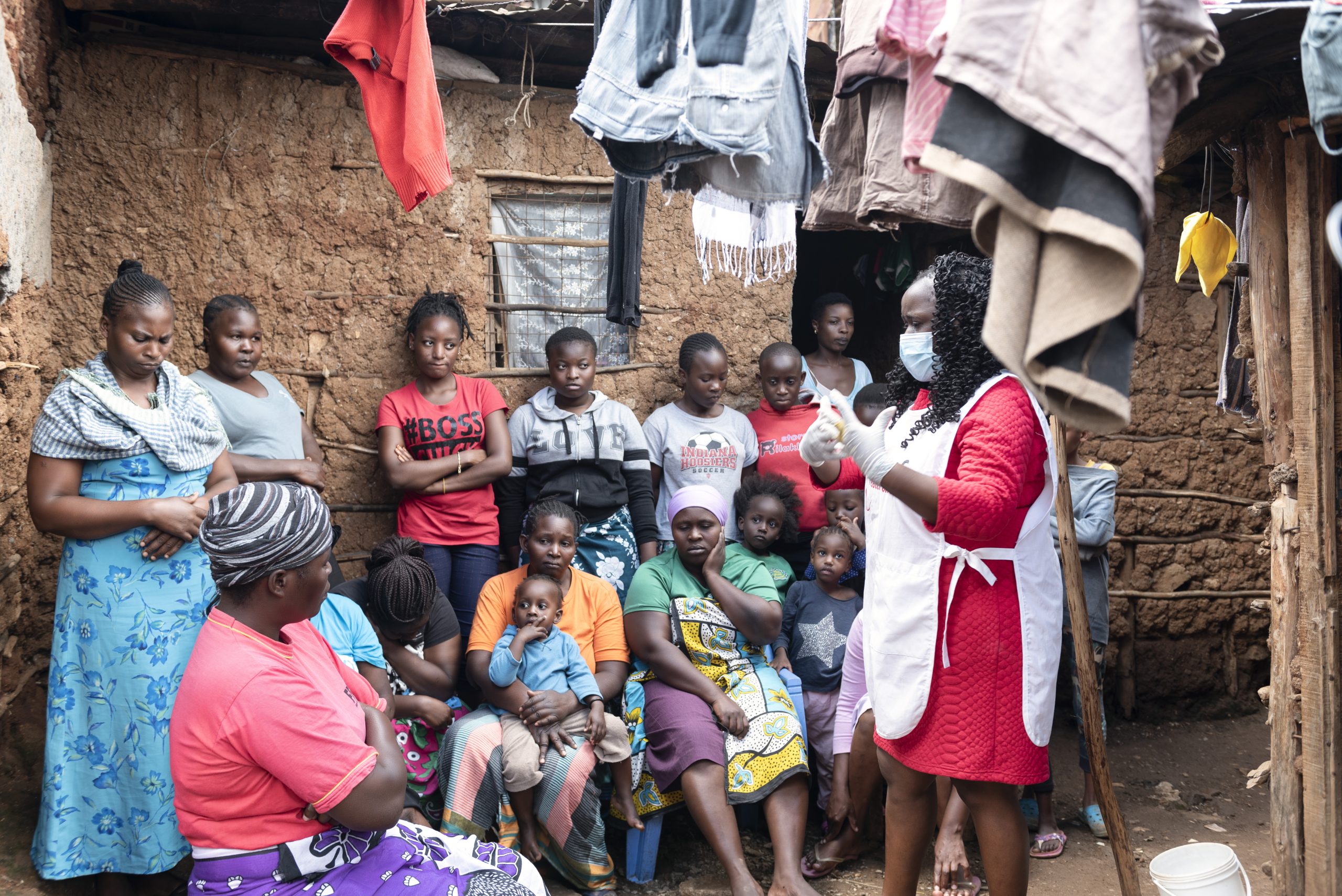

58% of youth in Kenya adopting a wait-and-see approach to COVID-19 vaccine, as social media and lack of confidence in pandemic response efforts emerge as key contributors to vaccine hesitancy
Nairobi, July 19th, 2021: A trio of studies conducted by Amref Heath Africa to assess the knowledge levels and attitudes of youth and Community Health Volunteers (CHVs) towards the COVID-19 vaccine has revealed substantial gaps that are likely to impact Kenya’s pandemic response.
The Determinants of COVID-19 Vaccine Behaviour Intentions Among The Youth In Kenya: A Vaccine Pre-Introduction Study has revealed that only 42% of youth in Kenya are ready to take the COVID-19 Vaccine. Of those who are not ready to be vaccinated, 52% say they are waiting to see the effects of the vaccine on those who have received it while 6% are completely unwilling to receive the vaccine.
The study, which sought to assess and establish the determinants of behaviour towards the COVID-19 vaccine among the youth in Kenya as an entry point to planning a countrywide vaccination programme, also reveals that vaccine hesitancy is higher among females, those who identify as Protestants, and those with post-secondary education. Those rejecting the vaccine point to social media as their main source of information. They also cite lack of adequate information and low trust in the Ministry of Health, as well as disbelief in the effectiveness or necessity of mass vaccination as the key drivers of their hesitancy.
In the case of Community Health Volunteers (CHVs), a separate study aimed at exploring their COVID-19 vaccine knowledge and establishing the determinants of their attitudes towards COVID-19 vaccination has revealed that 81% of CHVs would accept the vaccine, and intend to engage with their communities regarding future COVID-19 vaccine rollout plans.
According to the study, titled COVID-19 Vaccine Hesitancy: Vaccination Intentions and Attitudes of Community Health Volunteers in Kenya, the hesitant group (19%) cites concerns over the safety of the COVID-19 vaccine as their main reason for rejecting it. Approximately 36% and 10% of this demographic say they rely on social media and community meetings respectively as their main sources of information. Conversely, those intending to get vaccinated are more likely to get their information from radio and TV (67%).
The study, which was carried out in Mombasa, Trans-Nzoia, Kajiado, and Nairobi counties, outlines the influence that access to COVID-19 sensitization and training, media channels used to disseminate information on the safety and effectiveness of COVID-19 vaccines and public trust in vaccine manufacturers and the goverment, have on influencing vaccine intention.
‘‘Young people, who also constitute a significant proportion of Community Health Volunteers, are becoming key family and community influencers through the information accessed via social and other media,” said Prof. Joachim Osur, Vice Chancellor, Amref International University, during the release of the studies. “While the youth may not be among the vulnerable population they are still highly susceptible to contracting the virus, so we must find ways to engage and empower them to allow them to make well informed decisions. Their acceptance of the COVID-19 vaccine may build confidence in mass vaccination.’’
A separate but related study indicates that 87% of CHVs do not feel informed enough to engage with communities on the COVID-19 vaccine, 50% of the CHVs do not feel informed at all while 37% feel informed – but to a very small extent. Moreover, CHVs have mixed knowledge on vaccine eligibility, need for preventive measures after vaccination and need for vaccination on COVID-19 survivors.
‘‘CHVs are key in mobilizing communities and driving vaccine acceptance, however they are only effective when they have substantial knowledge of the vaccines and are themselves ready to accept vaccination,’’ said Dr. Meshack Ndirangu, Country Director, Amref Health Africa in Kenya. “The fact that only 68% of CHVs consider COVID-19 precautions to be necessary after vaccination means that we still have to do the work of educating them, because they are the strongest link between communities and the health system.”
Persistent vaccine hesitancy remains a global challenge and a key barrier to achieving herd immunity through mass vaccination, which is the most promising intervention to end the COVID-19 pandemic.
To address the issue, the three studies propose a range of measures to be taken by the government and other stakeholders in health, including: designing and implementing a robust communication strategy on the COVID-19 vaccine to provide accurate information to youth and CHVs; strengthening health system responses and engaging youth, CHVs, and religious leaders to reduce COVID-19 vaccine hesitancy by boosting public trust in the government; training CHVs on COVID-19 prevention and vaccines and equipping them with the tools they need to support community sensitization; and taking into account contextual gender disparities when designing and implementing the COVID-19 vaccine rollout.
[Ends]
Notes to Editors
About Amref Health Africa
Amref Health Africa, headquartered in Kenya, is the largest Africa-based International Non-Governmental Organisation (INGO). With a focus on increasing sustainable health access, Amref runs programmes in over 35 countries in Africa, with lessons learnt over 60 years of engagement with governments, communities and partners. Amref Health Africa also engages in programme development, fundraising, partnership, advocacy, monitoring and evaluation, and has offices in Europe and North America as well as subsidiaries: Amref Flying Doctors, Amref Enterprises and the Amref International University.
For more information contact:
Elizabeth (Lizz) Ntonjira
Global Communication Director
Amref Health Africa
Email:Elizabeth.Ntonjira@amref.org
Achuman Emoni stretches her hands, illustrating the vast distance she has travelled to reach the…
During a session held at Africa Health Agenda International Conference in Kigali, Rwanda, on 4th…
Amref Health Africa, in collaboration with the Turkana County Department of Health Services, introduced the…
Amref Health Africa, in collaboration with the Turkana County Department of Health Services, introduced the…
Over the past six years, Amref Health Africa has positioned itself as a leading voice…
Africa has made significant strides in advocating for health research and development, yet gaps in…